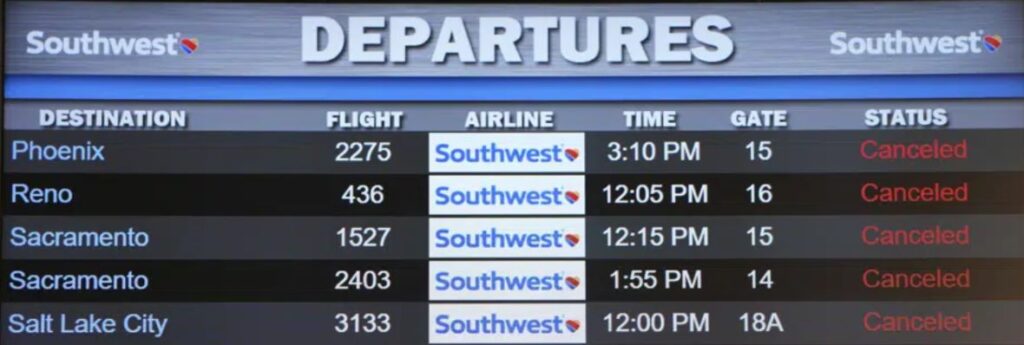With its flights running on a roughly normal schedule again, Southwest Airlines is now turning its attention to repairing its damaged reputation after it cancelled 16,700 flights around Christmas and left holiday travellers stranded.
CEO Robert Jordan says that Southwest has processed about 75% of the refund requests it has received. The airline has also returned most lost bags to their owners and hired an outside firm to sift through requests for reimbursement of things like hotels and meals that stranded passengers paid out of their own pockets, he said.
The massive disruptions began Dec. 22 with a winter storm and snowballed when Southwest’s ancient crew-scheduling technology was overwhelmed, leaving crews and planes out of position to operate flights. It took the airline eight days to recover.
Jordan said in a brief interview late last week that Southwest is still studying what went wrong, and he doesn’t want to make changes in technology until that review is done. He expressed optimism but offered few specifics about avoiding a repeat meltdown.
Southwest is giving 25,000 frequent-flyer points to customers whose flights were cancelled or significantly delayed between Dec. 24 and Jan. 2, and seems to be making progress on refunds, but executives concede it will take many weeks to process the reimbursement requests.
Southwest hopes that refunds, reimbursements, and loyalty points will persuade people not to switch to other airlines, known in the industry as “booking away.”
“Book-away typically has a short half-life, perhaps as little as a month, given it appears from many accounts that Southwest is being very generous reimbursing not only flight but other out-of-pocket costs” and is serious about fixing the technological shortcomings that made the crisis worse, said Robert Mann, an airline consultant in New York.
Retaining loyal customers is crucial if Southwest is to limit the financial damage of the meltdown. The company has yet to say how much money it lost because of the cancelled flights – Jordan promised more information before Southwest reports quarterly results on Jan. 26.
Experts estimate that the storm will it close to US$600 million in lost revenue, plus higher expenses such as vouchers and frequent-flyer points.
Airlines – including Southwest as recently as October 2021 – have recovered quickly from previous meltdowns, whether they were caused by bad weather, crew shortages, IT outages or other factors. Passenger numbers, if they declined at all, recovered quickly.
“The reputational damage is only as relevant as what consumers can do about it,” said Michael Mazzeo, who teaches strategy at Northwestern University’s business school and has examined airline competition. “In a lot of markets, there is little or no competition to Southwest. When there is no outlet for consumers, the damage is more limited.”
Southwest remained relatively quiet for several days even after it became clear that it was struggling while other airlines recovered from the winter storm — and after it came under repeated criticism from consumers, media reports and Transportation Secretary Pete Buttigieg.
The debacle has focused attention on Southwest among lawmakers in Congress with Sen. Richard Blumenthal vowing to re-introduce a “passenger bill of rights,” which failed to become law in the last Congress.
“The Southwest debacle creates a moment when the forces in favor of this kind of consumer-protection measure could prevail,” he said in an interview.
“The airlines are going to lobby hard to have as little regulation as possible, but with each passing meltdown it becomes more apparent that real change is needed,” said John Breyault, vice president of public policy at the National Consumers League.

